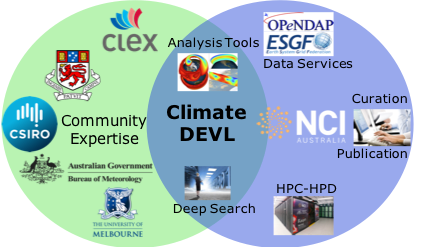A Collaborative Effort in Preparation for CMIP6
The Climate Data Enhanced Virtual Laboratory (DEVL) project focused on some key components of the infrastructure to prepare this massive data archive and make accessible for CMIP6-based research in Australia. It was built on previous Australian e-infrastructure programs, and Climate & Weather Science Lab, and the National Earth Systems Data Collection and Data Services programs. It was also a component of NCIs leading role in international collaborations, such as the Earth Systems Grid Federation (ESGF) that provides the international federated capability for CMIP data. The value of this work over a long time required funding from various parties including other NCRIS funding programs: ANDS, RDS, and NeCTAR (now the Australian Research Data Commons). This infrastructure directly supported other major investments from government-funded research from CAWCR (Collaboration for Australian Weather and Climate Research), NESP (National Environmental Science Program) and the ARC CoE for Climate System Science (ARCCSS) and ARC CoE for Climate Extremes (CLEX).
Providing FAIR CMIP Data
The Climate data at NCI is provided using the principles of FAIR: Findable, Accessible, Interoperable and Reusable. Providing a FAIR data service for such a large and complex data collection exposes significant data management challenges. NCI’s Data Quality Strategy (DQS) delivers data curation practices that permit FAIR standards and interdisciplinary data availability. This service permit streamlined access and analysis of CMIP6 data, enabling efficient state-of-the-art climate science research to be undertaken.
The unique challenges of the CMIP in both size and complexity has required new services to be developed and then made available as well managed operational services. The Climate DEVL defined and developed the mechanisms for improved accessibility and usability of the data.
Additional and Ongoing Work
Another aspect of the Climate DEVL was to focus a community approach to define the highest priority CMIP6 data needing to be replicated in Australia for local analysis, to permit timely development and publication of scientific research papers analysing the CMIP6 data as it becomes available. The DEVL also supports the evaluation of various model analysis tools, which provides an opportunity for the community to develop standardised workflows for data analysis contributing to the aforementioned research papers.
The Climate DEVL also provides a home for coordinating the ongoing development and availability of training materials necessary for a streamlined user experience. The extensive knowledge and interdisciplinary topics that span CMIP mean that effective training is needed, including face-to-face tutorials, online self-paced learning materials, and trainer training. The combined effort of NCI, CLEX, CSIRO and BoM permit such collaborative training efforts to benefit the entire Australian climate science community.
Following the completion of the main CMIP6 preparation, the services are being maintained by NCI, with support from NCRIS and our partners to support the ongoing need for data storage and services.
Collaborators
The Climate DeVL was a collaborative project involving NCI, CSIRO, the Bureau of Meteorology, the ARC Centre for Climate Extremes and co-funded by the Australian Research Data Commons (ARDC).



